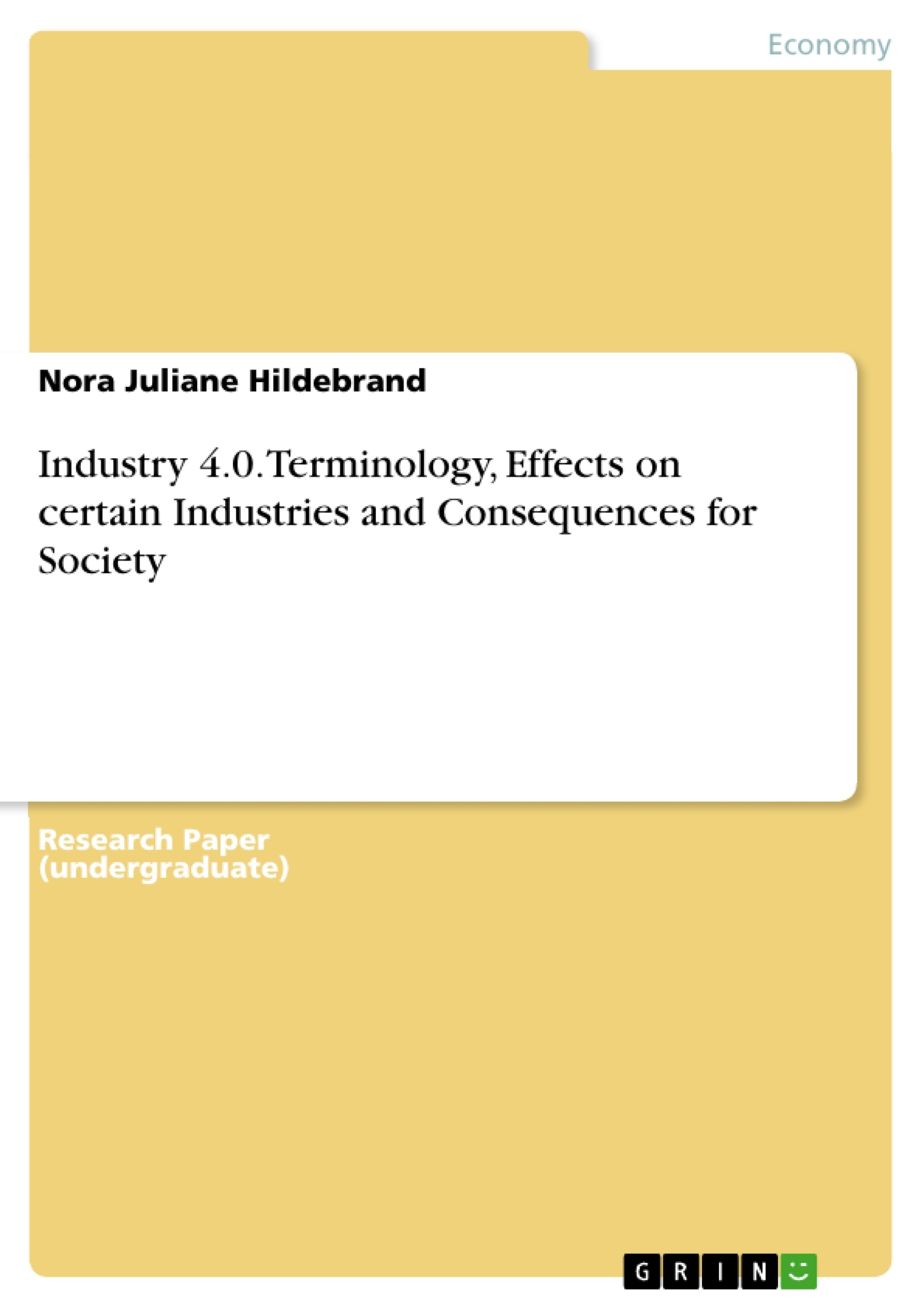This paper is about the phenomenon "Industry 4.0" and what effects it has on the automotive industry, the pharmaceutical industry and agriculture. Especially the great differences between these sectors make it interesting to take a closer look on how far and in which way smart technologies have been realised until now and what impact they might have on the future.
Inhaltsverzeichnis (Table of Contents)
- 1. Introduction
- 2. Historical background and explanation of terms
- 3. Analysis of Industry 4.0 in different sectors
- 3.1 Automotive industry
- 3.1.1 Industry description
- 3.1.2 General trends within the automotive industry
- 3.1.3 Implementation of Industry 4.0
- 3.1.4 Forecast
- 3.1.5 Conclusion
- 3.2 Pharmaceutical Industry
- 3.2.1 Industry Description
- 3.2.2 General Trends and Challenges
- 3.2.3 Implementation of Industry 4.0
- 3.2.4 Forecast
- 3.2.5 Conclusion
- 3.3 Agriculture
- 3.3.1 Industry description
- 3.3.2 Agricultural development and consequences
- 3.3.3 Implementation of Farming 4.0
- 3.3.4 Forecast
- 3.3.5 Conclusion
- 3.1 Automotive industry
- 4. Governmental and Non-Governmental Impacts
- 4.1 Situation in Germany and the European Union
- 4.2 International Situation
- 4.3 Challenges and International Policy Indications
- 5. Consequences
- 5.1 Disruption in the Labour Market
- 5.2 The Financial Sector as the first Loser
- 5.3 Cyber security
- 5.4 Ethical grounds
- 5.5 A workless future
- 5.6 Universal Basic Income
- 5.7 Winner takes all dilemma
- 6. Conclusion
- 7. Literature
Zielsetzung und Themenschwerpunkte (Objectives and Key Themes)
This work aims to provide an in-depth analysis of Industry 4.0, its historical background, its implementation across various sectors, and its potential consequences for society. Key themes explored include:- The impact of Industry 4.0 on different industries, including automotive, pharmaceuticals, and agriculture.
- The challenges and opportunities presented by the integration of technology and automation in these sectors.
- The potential implications of Industry 4.0 for the labor market, the financial sector, and broader societal issues such as cyber security and ethics.
- The role of governments and international organizations in shaping the future of Industry 4.0.
- The potential for Industry 4.0 to drive innovation, economic growth, and societal progress while addressing potential risks and challenges.
Zusammenfassung der Kapitel (Chapter Summaries)
- Chapter 1: Introduction provides an overview of Industry 4.0, its significance, and the key concepts that will be explored throughout the text.
- Chapter 2: Historical background and explanation of terms delves into the historical evolution of Industry 4.0, tracing its roots from previous industrial revolutions and explaining key terms and concepts related to this technological transformation.
- Chapter 3: Analysis of Industry 4.0 in different sectors examines the specific implementation of Industry 4.0 in various industries, including the automotive industry, the pharmaceutical industry, and agriculture. This section explores the challenges, opportunities, and potential impacts of Industry 4.0 in these sectors.
- Chapter 4: Governmental and Non-Governmental Impacts explores the role of governments and international organizations in shaping the future of Industry 4.0. This chapter analyzes policies, regulations, and initiatives aimed at promoting and managing the transition to Industry 4.0.
- Chapter 5: Consequences examines the broader societal implications of Industry 4.0, analyzing its potential impact on the labor market, the financial sector, cyber security, ethics, and other critical areas.
Schlüsselwörter (Keywords)
This work focuses on key concepts related to Industry 4.0, including its impact on different industries, automation, technological advancements, labor market implications, ethical considerations, and the role of governments and international organizations in shaping the future of this transformative technology. Key terms include: Industry 4.0, automation, digitalization, cyber-physical systems, Internet of Things (IoT), artificial intelligence (AI), labor market, financial sector, cyber security, ethics, government policy, and international cooperation.Frequently Asked Questions
What is Industry 4.0?
Industry 4.0 refers to the fourth industrial revolution, characterized by the integration of digital technologies, automation, and the Internet of Things (IoT) into manufacturing and production.
How does Industry 4.0 affect the automotive industry?
It enables smart factories, highly customized production, and improved supply chain efficiency through real-time data and robotics.
What are the challenges of Industry 4.0 in agriculture?
Key challenges include high initial costs, the need for technical expertise, and ensuring reliable data connectivity in rural areas (Farming 4.0).
What are the social consequences of increased automation?
Potential consequences include labor market disruption, the need for new skills, and discussions about Universal Basic Income (UBI) as jobs are replaced by AI.
Why is cyber security critical for Industry 4.0?
As production systems become more interconnected and digitalized, they become more vulnerable to cyberattacks, which can cause significant economic and physical damage.
- Quote paper
- Nora Juliane Hildebrand (Author), 2017, Industry 4.0. Terminology, Effects on certain Industries and Consequences for Society, Munich, GRIN Verlag, https://www.grin.com/document/453991



